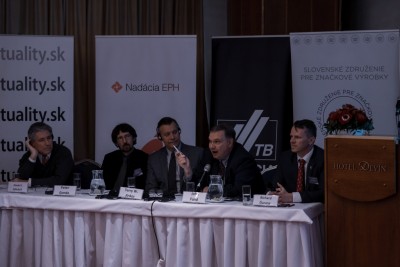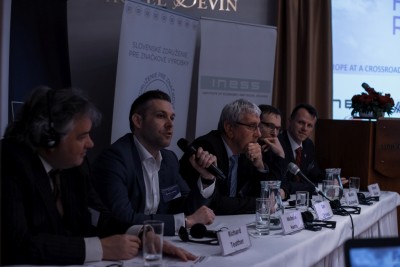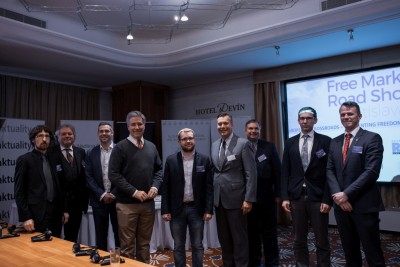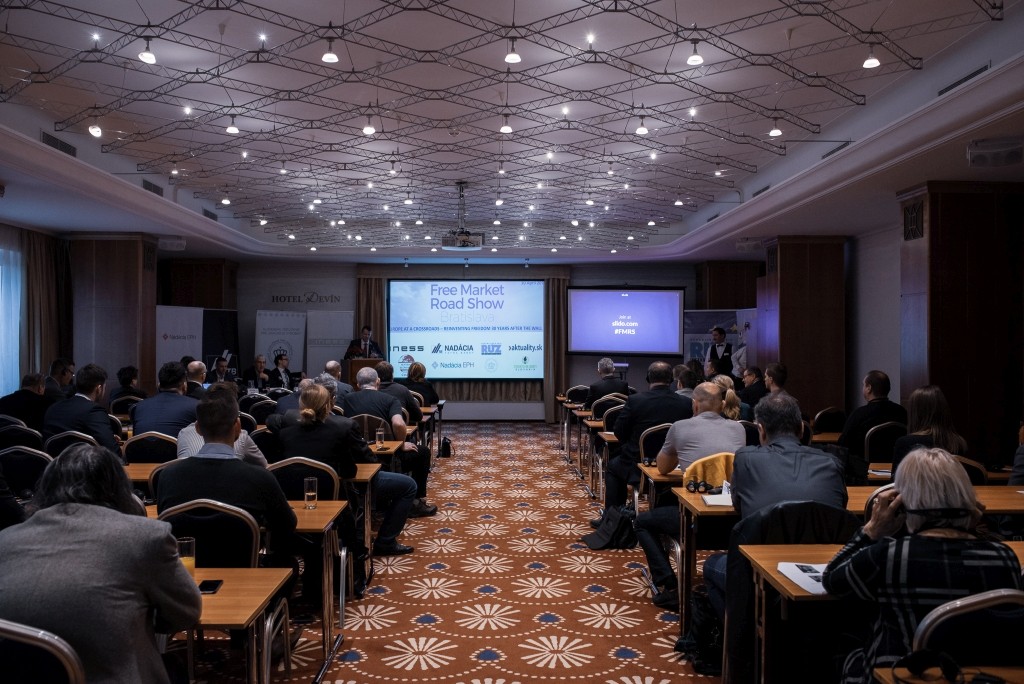Institute of Economic and Social Studies (INESS) has been organizing Free Market Road Show for a few years now. It is a unique series of conferences which has been organized in more than 30 capital cities across Europe and Caucasus.
This year, it was the 11th conference to be held in Bratislava (Bratislava was one of four cities in which the tour originated). The hosted discussions tackled multiple economic issues as well as their possible solutions.
The Slovak part of the conference was held in hotel Devín on April 10th, 2019, with approximately 90 participants. Furthermore, the event enjoyed the presence of distinguished guests – politicians, ambassadors, entrepreneurs, journalists, representatives of interest groups as well as non-profit organizations and students.
This year, the emphasis was put on two main topics: (1) Doing business in Europe 30 years after the fall of socialism, and (2) The Future of Europe as a part of a panel called “Europe at a Crossroads”.
 The conference was launched by Richard Ďurana, the director of INESS. He elaborated on the program of the conference and explained the topics to be discussed.
The conference was launched by Richard Ďurana, the director of INESS. He elaborated on the program of the conference and explained the topics to be discussed.
Afterwards, the first discussion panel, devoted to business in Slovakia and Europe 30 years after the fall of socialism began. Only 37% of Europeans wants to do business. On the other side of the Atlantic, 51% of Americans and 56% of Chinese want to start a business. How can we change the meaning of the term entrepreneur? What is the trend in (de)regulation of the business environment and what is the role of the European Union and the member states? What recommendations should the politicians (not only) in Slovakia follow from the long-term perspective? These were the objectives discussed in the panel.
Martin Vlachynský, an analyst from INESS, provided the first opening remark by assessing the business environment in Slovakia in the 1990s and compared it to the current situation. For a better comprehension, he stressed significant advantages and disadvantages of doing business for both periods respectively. As an example of negative laws that have had an influence on the business environment these days, he identified the special retail chain tax.
The second speaker was Nicholas Harris (SUI), the director of Public Affairs at Japan Tobacco International based in Geneva, Switzerland. Mr. Harris depicted the situation regarding over-regulation of businesses. For further illustration, he used the example of packaging of various products targeted to influence the choice of a consumer as an unsuccessful policy that did not meet the expected results. Subsequently, he offered his view on how the right regulation should look like.
The next speaker was Richard Teather (UK), a leading British academic specializing in offshore tax jurisdictions and a Senior Lecturer in Tax Law at Bournemouth University. Mr. Teather focused on the topic of tax harmonization. He pointed out the extent to which taxes influence the consumption of subjects and the level of GDP. Furthermore, he noted that the European Union is preparing harmonization of taxes by the means of common consolidated base of corporation tax. He used this situation as the basis for his explanation why Brexit would be beneficial for the United Kingdom and how the UK can become the European Singapore.
 The president of Entrepreneurs Association in Slovakia and the vice-president of the The National Union of Employers, Mr. Ján Oravec, was the next to take the floor. He spoke about the restoration of freedom and how liberal democracies privately become illiberal. Freedom is indivisible – both civically and economically. However, the economic freedom is seldom noticed, since there are no protests against its restriction. Mr. Oravec claimed that our society is based on permissions, so entrepreneurs can do only what they are permitted to.
The president of Entrepreneurs Association in Slovakia and the vice-president of the The National Union of Employers, Mr. Ján Oravec, was the next to take the floor. He spoke about the restoration of freedom and how liberal democracies privately become illiberal. Freedom is indivisible – both civically and economically. However, the economic freedom is seldom noticed, since there are no protests against its restriction. Mr. Oravec claimed that our society is based on permissions, so entrepreneurs can do only what they are permitted to.
The remarks were succeeded by a discussion during which the participants had the opportunity to ask questions through Sli.do. In the process, Mr. Harris clarified that sufficient information sharing and communication in society, as well as recognition of who is responsible for which particular matter, can help solve the issue of transfer of responsibility to the state.
Mr. Teather answered the next question regarding tax havens and the factors that are decisive when entrepreneurs consider moving their businesses elsewhere. Also, he stressed that not all tax havens are the same and that it usually depends on what is the aim of a particular entrepreneur. Some tax havens are over-regulated, although the taxes may still be low.
According to Mr. Teather, the Cayman Islands are suitable for international investments, while Hong Kong is immune, because nobody wants to gamble with China.
PHOTO GALLERY
The next question was for Mr. Oravec and he was asked, what would he do if he were to become the Minister of Economy. Ján Oravec quickly dismissed the possibility, since such a position would be pointless for him and the change needs to happen in the government as a whole, not in the form of a personal replacement of one minister.
The second panel was devoted to the topic of “Europe at a Crossroads.” Mr. Terry W. Anker (USA), the president of Anker Consulting Group, was the one to open the panel. He pointed out that it is necessary to know how specific markets form and influence our society by comparing the Western and the Eastern tradition. To his mind, the Western countries put emphasis on human resources, natural resources and private property much more in contrast with the Eastern countries, where there is lower importance put on these aspects.
 Next, Mr. John Fund (USA), an analyst and columnist for Fox News, talked about his personal experience with taxi drivers in Bratislava. He explained that their behavior could have a significant negative impact not only on citizens, but also for tourists and investors.
Next, Mr. John Fund (USA), an analyst and columnist for Fox News, talked about his personal experience with taxi drivers in Bratislava. He explained that their behavior could have a significant negative impact not only on citizens, but also for tourists and investors.
Uber was prohibited and as of April, there are new regulations for Taxify, due to which it lost 80% of its drivers. Mr. Fund suggested the regulations to be postponed at least for 16 days, when the Ice Hockey Championship will take place in Slovakia.
The third speaker of the panel was Peter Gonda, the director of Conservative Institute of M.R. Štefánik. The topic was socialism and its economic reality. He disclosed that socialism is perceived positively for various reasons – nostalgic optimism, spread of myths, the stability it offers at the expense of freedom.
Subsequently, he tried to refute myths about socialism. He illustrated how the GDP fell after the dissolution of socialism in contrast with the western neighbors and claimed that nowadays, people can afford much more goods and services than in the times of socialism. In his view, socialism is a historic and intellectual error.
Daniel J. Mitchell (USA), a public-policy economist from Washington, DC, and the co-founder of the Center for Freedom and Prosperity was the next addition to the second panel. His focus was on freedom in Europe, challenges that Europe is facing these days (fiscal burden, demography, bureaucracy, protectionism) and Brexit. Additionally, he compared the levels of economic freedom during 30 years of development.
During a discussion that followed, Daniel J. Mitchell answered two questions from the audience. The first question was related to migration from the third countries. Mr. Mitchell stressed that there is an important difference between migrants that are tax payers and those that receive social benefits.
The second question tackled progressive taxation of income – Mr. Mitchell argued that Western countries became wealthy without income taxes, because this type of a tax can cause economic problems and decrease economic activity. Peter Gonda added that politicians are trying to impose taxes on the rich, but by those means, they are influencing the middle and lower class of the society.
The next question was for John Fund. He was supposed to explain increasing global dominance of platforms like Uber or Google. He claimed that regulations will not help consumers, quite the contrary. All of these platforms are facing increasing competition. Mr. Anker added that the market should be left open, and Uber will not be a priority platform e.g. in 10 years, because a new company will take its place, just like it happened many times in the past.
On the topic of Freedom vs. Stability, Mr. Gonda claimed that when we are thinking of Sweden as the perfect example of socialism, we need to take into consideration the fact that it became wealthy thanks to capitalism and free market and that welfare state introduced in the 1970s is now facing a slow decline, with tax and regulative burden also decreasing. John Fund suggested that the young often do not perceive socialism for what it was and the example of that could be any public opinion poll concerning the topic.
The conference was closed by final remarks of Kai Weiss from Austrian Economics Center (AT) and Richard Ďurana from INESS.
Partners of the conference were: Austrian Economics Center, Nadácia Tatra banky, Nadácia EPH, National Union of Employers, Slovak Associations for Branded Products (SZZV), Students for Liberty Slovakia. Aktuality.sk was the conference’s media partner.
For more information and presentations of the above-mentioned speakers, visit the following website: http://iness.sk/fmrs/
Translated by Diana Kráľová (INESS)



